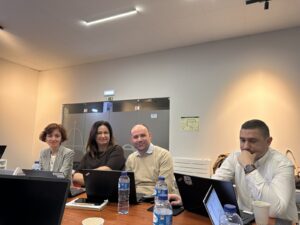USEIPM Workshops in Faro – November 2025
As part of the study visit organized from 12–15 November 2025 at CRIA – the Division of Entrepreneurship and Technology Transfer, University of Algarve, members of the USEIPM project participated in a series of eight thematic workshops designed to provide an in-depth understanding of the university’s innovation ecosystem, entrepreneurial support structures, and technology transfer processes. The workshops covered a broad spectrum of topics essential for building strong innovation ecosystems. These included:
- Institutional role of UAlg and CRIA,
- Entrepreneurship and business development,
- The UAlg TEC innovation ecosystem,
- Intellectual property and licensing,
- Territorial cooperation programmes,
- Technology transfer processes,
- Entrepreneurship education, and
- Applied innovation case study in the agrofood sector (HOST Lab).
Throughout the four days, participants explored these topics in practice, learning how the University of Algarve fosters innovation through institutional mechanisms, interdisciplinary collaboration, and active engagement with regional industry partners. The study visit concluded with a practical case study from the agrofood sector—the HOST Lab—demonstrating how applied innovation operates within specific industry contexts.
A central theme across all sessions was the importance of strengthening collaboration between universities, researchers, companies, and regional innovation actors. Participants gained insight into how structured networks, access to laboratories, incubation services, and Technology Transfer Office (TTO) support can accelerate technological development. Special attention was given to the value of early identification of commercial potential in research, proper management of intellectual property rights, and strategic use of regional and European cooperation programs to enhance international project engagement. The HOST Lab case study further highlighted how sector-specific innovation environments bridge the gap between academic research and market needs.
The workshops brought together team members from four project countries:
Serbia: Vesna Janković Milić, Marija Radosavljević
North Macedonia: Vesna Bucevska, Stojan Debarliev
Bosnia & Herzegovina: Milica Marić, Ljubiša Mićić
Albania: Brikena Leka, Arjan Tushaj
In addition to the workshop program, participants were introduced to the Industry-Driven Doctoral Research Model (IDDR Model)—a structured approach to doctoral training based on collaboration between universities and companies. This model enables PhD candidates to define their research topics together with industry partners, ensuring that academic work is directly aligned with real market challenges. The IDDR model provides mutual benefits: universities enhance the relevance of scientific research, companies gain access to specialized talent and innovation potential, and students receive financial support, access to real-world data, and improved employment prospects. The model’s structured process—from identifying company needs and co-designing research topics, to tripartite agreements, dual supervision, and joint evaluation—was presented as an effective framework for strengthening university–industry cooperation and building sustainable innovation ecosystems.
Overall, the USEIPM workshops in Faro offered participants valuable hands-on learning, exposure to successful innovation practices, and opportunities to strengthen cross-border collaboration in research, entrepreneurship, and technology transfer. The program underscored the importance of integrated, practice-oriented approaches for building resilient innovation systems across the Western Balkans.
















